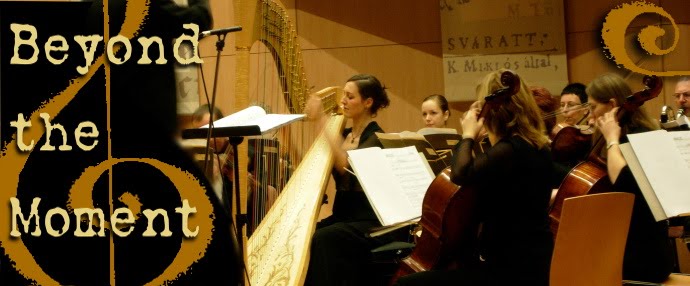Mr. Yedid attended the entire first stage of the competition, during which he video-taped several of the contestants. You can find ten different performances of his piece on the YouTube page he created for this purpose.
Tell me about the inception of Out to Infinity. How did you come to be commissioned to write this piece for the competition?
It was about three years ago when I received a message from the harp contest that the artistic jury (they are different people from the other jury - mostly composers like Serge Natra and Ami Ma'ayani) decided to commission a piece for a solo harp from three Israeli composers, for the 50th anniversary of the harp contest. Based on a blind review of the three pieces, they chose one to be the compulsory piece. I think they asked me because I was awarded the prestigious 2006 Israeli prime minister prize for composers. I was the youngest among the three composers. I was of course pleased with the commission.
I wished to compose something really new, to bring a different sound from the harp, and for sure not to go for the typical sound that is associated with the harp. So I decided to compose a piece in which the harpist would also use the piano strings, which would be prepared in advance with the sustaining pedal pressed for the whole piece. I actually started the piece, but I had to ask my harpist friend a technical question and she told me that probably the harp contest woouldn't agree to such an idea. I phoned the contest and they rejected it totally!
At that time, I had just moved to Queensland in Australia, and my wife and I stayed for a month in a tiny studio apartment on a noisy road in a guest house without a piano. It was there where I composed the piece. The infinity concept is about thoughts and imagination that one has in such a remote and beautiful place but so far away from his/her usual place.
What kinds of music most influence your compositional style?
Listening to my music, in a way is like watching a film - there is a story and images. Some images may sound like an Alfred Hitchcock film (like the opening chord), but within the same piece I could also have images of an Arabic singing ritual.
Had you ever composed for the harp before writing this piece?
I hadn't composed for the harp before so I sat at a library for a few days and went through scores. I especially researched S. Natra and L. Berio.
Did you consult with a harpist during the creation of the piece?
I actually met with a harpist only after I had completed most of the piece. I wanted someone to check it and also wanted to hear how it sounded, so I googled to see if there was a harpist in the area. It happened to be that a great harpist, Sebastien Lipman, who also participated in the contest in the past (was in the final) and was for many years the harpist of the great Berlin Philharmonic, lives in Brisbane. So I phoned him; he was surprised but very welcoming. He read through the piece from the manuscript - I compose only on paper with a pencil, no computer - and said it is not a easy piece at all, and contestants will have to invest lots of time to put together the non-legato, two-hands, tick-tak concept. He gave me some notation suggestions. Thanks to him, I was able to make it very clear how I wished it to sound. After that I also had a great harpist from Israel, Gitit Boasson, to help me edit the piece before it was printed by the Israeli Music Institute.
* * *
Yitzhak Yedid is a "composer of classical music but also a pianist of improvised music." He has released eight CDs with the German Label BTL and with International Challenge records. He makes his living from composing commissions and performances as a pianist with his ensemble. Currently, he is completing his PhD research at Monash University in Melbourne.








